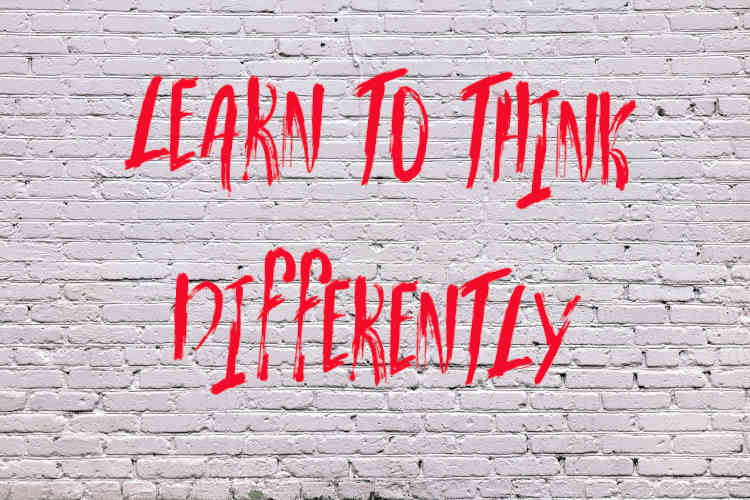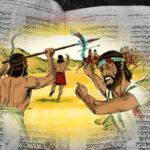I have been following Jesus, albeit imperfectly, for about 60 years!
It was during the period from about October 1961 to September 1962 that I decided not only that I believed in Jesus, but I was willing to follow him in my life.
Since that time in a reformed evangelical church, I’ve come to think very differently about almost every aspect of following Jesus. I think you may find some of the most significant changes helpful.
Conversion vs discipleship
We used so very different language in those days than I would use today (though many churches still seem to use the same language today!). Conversion was a matter of “asking Jesus into your life” or “having personal faith in Jesus” – personal to distinguish it from a cultural or family belief that you hadn’t decided for yourself.
I think there were useful emphases back then, but I think the more Biblical concept is following Jesus, which meant committing to being his disciple and living under his leadership. The old words don’t imply any obligation, but now I would emphasise (as I believe Jesus did) the obligation to serve and obey his teachings.
Apologetics
As soon as I had stepped across that line, I wanted to be able to show why christianity was true. Initially, this was to try to prove to others, but later it became more for my own benefit. And so I began a lifelong habit of reading books that consider the truth of christian faith rather than devotional books. CS Lewis was my favourite, but other books on the resurrection, the New Testament texts and philosophy were important to me.
Apologetics is a dangerous game if you do it honestly. It forces the apologist to consider anti christian arguments and facts. And if we are honest, some conservative christian beliefs stand on shaky ground. And so apologetics forced me to reconsider.
Understanding Jesus in his historical and religious context
This was the first domino. I was trying to put together a suite of Bible passages that demonstrated what I understood to be the gospel (pretty much what Billy Graham was preaching at the time). I noted that the verses I had all came from the apostle Paul (the so-called Romans Road, etc) and none of them came from Jesus.
So I began searching the gospels for evangelical sayings from Jesus, and I just couldn’t find any that fit my understanding. “Jesus wasn’t a very good evangelist” I concluded. Of course straightaway I knew that couldn’t be the right conclusion. I knew that my understanding of Jesus, or the gospel, or both, was deficient.
And so I began a search. I found Scottish theologian AM Hunter’s book The Work and Words of Jesus, and it was like a laser beam in a dark room. Suddenly I could see Jesus as a Jewish revolutionary prophet, teacher and healer, the Messiah, the one who embodied the kingdom of God on earth. The gospel became exciting and Jesus became a much more real person to me.
This view has never left me, and I’ve had to fit everything else in around it and see everything else in that light. That book is one of the most influential I have ever read.
Vietnam, the army and non-violence
The Vietnam was was on, Australia was involved and to bolster its small army, the government began conscripting about 1 in 12 twenty year olds. (One of many decisions that government made that showed little care for people.)
It was a lottery, my birthday came out and I was conscripted. I had been taught that communism was evil and had to be resisted, and so I wasn’t a conscientious objector. I served my 2 years, learnt to march, salute, fire a rifle and machine gun and throw a grenade, and operate a radio.
I absolutely hated it. (Though there were some fun moments among fellow conscripts too.)
I also observed and experienced the behaviour of an all-male group and how the army induction program is design to depersonalise you and make you ready to kill someone if ordered to. I loathed it.
I thought about the sermon on the mount and decided jesus was right and the army was not, and I became a christian pacifist. When I was discharged, I grew my hair longer and grew a beard – not deliberately I guess, but probably somehow affected by my two years. I wouldn’t say I’m a total pacifist, but I’m close.
The lost world of the Holy Spirit
A few years later I was becoming disillusioned with the denominational church. I was a very young elder in the Presbyterian church, but also reading the book of Acts. I could see the first century christians had faith, commitment and gifts that I lacked. And I could see the first century church was different in so many ways from the modern church.
I started looking around to find alternatives.
The house church movement interested me because it seemed to cut out all the expensive buildings, and bypassed the clergy to use the gifts of lay people. The charismatic movement also attracted me, because clearly here was a community that had many of the things I lacked.
I got involved in both scenes for a while, learnt a heap, but never could go the whole way with either movement. The house churches were too often insular and inward looking, while the charismatics tended to misrepresent the Bible and press too much on others.
But I could see both movements had a lot to teach most christians. The Holy Spirit remains the neglected person of God in many evangelical churches, to their cost.
Justice and mercy
In my christian youth, good works were somehow viewed with suspicion. The danger was the “social gospel”, which was salvation by works rather than God’s grace. Mercy was sort of OK, provided it supported gospel evangelism, but justice was political and therefore bad. It wasn’t really said explicitly, but that was what I somehow absorbed.
It took time, but I began to feel uncomfortable with all this. It was Jesus again (it so often is!). He said a lot about justice and mercy, and not really so much about evangelism. I could see he was talking to God’s chosen people, whereas I live in a predominantly gentile society, but I didn’t really feel we could write off his statements so easily. The parable of the sheep and goats (Matthew 25:31-46) was too stark to ignore.
I tried to find doctrinal formulations that fit in evangelism and justice and mercy. And in the meantime I decided I would try to do both even if I couldn’t work it all out.
I don’t think I’m there yet, but I feel sure that:
- We focus too much on personal “salvation”, by which we mean a ticket to heaven, while salvation to Jesus meant wellbeing in this life too. His focus was the kingdom of God on earth.
- Our acceptance with God comes from his grace towards us, as does our very existence. But we receive that grace through our faith and being part of his mission of bringing in the kingdom on earth. If our faith doesn’t include good deeds, then it is dead.
I kind of expect some apparently “good” christians may be uncomfortably surprised when they meet God, and some non-believers may have a pleasant surprise awaiting them. (I’m not sure what reception I will get!) But I also feel God’s grace can cover all of that, even if I don’t understand how.
But this belief makes a lot of difference to how I try to live, and will in time change the church, I believe.
The Bible vs dogma
I was taught as a young christian that while the Bible might not be totally without error, it was pretty close. After all, it was the “word of God”, and God wouldn’t make any mistakes, would he?
But the more you read the Bible, the more cracks start to appear in that doctrine.
For a start, I checked and I couldn’t find anywhere that the Bible claims to be the word of God. Mostly “word of God” means words spoken through the prophets (Old Testament) or the message about Jesus (New Testament).
First to fall was a literal reading of the Genesis creation story. It is clearly some sort of folk tale, and doesn’t lose anything by being seen in that way.
I was troubled about many other parts of the Old Testament, and for decades I put that problem aside for I couldn’t see a reasonable answer. Then for a couple of years I prayed regularly that God would show me the truth. I felt he led me to books that showed that much of the early Old Testament was legendary.
The New Testament, of course, was a different animal, and historians say that it can be considered good, though not perfect, history.
So I came to see that evangelical dogma about the Bible gets in the way of truth and understanding. Trying to defend a literal-historical worldwide flood, the feasibility of 2 million Israelites escaping across the desert from Egypt, the ethics of the Canaanite genocide and the command for Abraham to sacrifice his son, ties christians in knots. Archaeology is often against them (despite misleading claims by well meaning apologists). The Bible itself is often against them because it tells different stories and sometimes inconsistent teachings. Worst of all, this dogma defends the Bible at the expense of impugning God’s character.
But if we let go of the inerrant word of God dogma and accept the Bible for what it is, we can see God at work refining and correcting until he has prepared the way for Jesus. We don’t have to defend the indefensible, and can get on with the mission of Jesus.
A loving God vs human weakness
The older I get, the more I realise my own weaknesses, and the weakness that seems to haunt every person and every church. I sometimes wonder why God allows so much evil and mistakes and foolishness.
But I’ve come to see that God can somehow cope with it all. He apparently can accept that the good he wants done on earth will always be faltering and compromised. Of course one day he’ll put everything right, but for now he leaves so much to us.
It is a comfort to know deep down that God will always frogive if we genuinely ask. We can always begin again. Sometimes we can make good what we have previously spoiled. But even if we can’t, his love and forgiveness are relentless.
I think this is often missed by those christians who take a legalistic line on matters of gender or behaviour. They may or may not be correct in their assessment, but their treatment of others often seems to forget that God can cope with human weakness (including their own). As CS Lewis said, we’ll finish life’s journey muddy and scratched, but there will be baths and new clothes.
The church will change
It has been clear to me for some time that the church is going through a revolution that will one day be seen as important as the Reformation. The church we see (in the west at any rate) is too often compromised, inward-looking, hidebound and comfortable, and has to do better.
The world has changed enormously in my six decades as a follower of Jesus, but in many respects the church hasn’t adapted. Too often it is living on past glories and fighting yesterday’s battles.
But I am confident it will change. It may need to be dragged kicking and screaming into God’s new future, but I believe it will get there. Not all congregations, but God’s people as a whole.
One of the big changes is the need for holistic and balanced ministry – word, Spirit, action and community. Too many churches do one or two well but miss on others. We need to see preaching much diminished, it is a lousy method of teaching and transforming. We need to see the clergy-laity division disappear, the end of rock star clergy, and all people trained, encouraged and supported to be followers of Jesus. We need to focus less on ourselves, membership numbers and property amd more on serving in the world, as individuals and as churches. And so much more.
Grateful but challenged
I am extremely grateful for the christian upbringing I received from my first church. It got me started in a good way. I still believe in the core doctrines of the christian faith, as expressed, for example, in the Apostles Creed.
But the past is another country and the future is with us now. I still feel challenged to continue to allow the Holy Spirit to guide me. I want to keep learning and thinking differently, where necessary, until the day I die.
Too important to stop there
I feel these topics are so important I intend to pick up on some of them in more detail in coming weeks. I hope you find all this as challenging and exciting as I do.
Photo by Marina with graffiti by unkleE.




